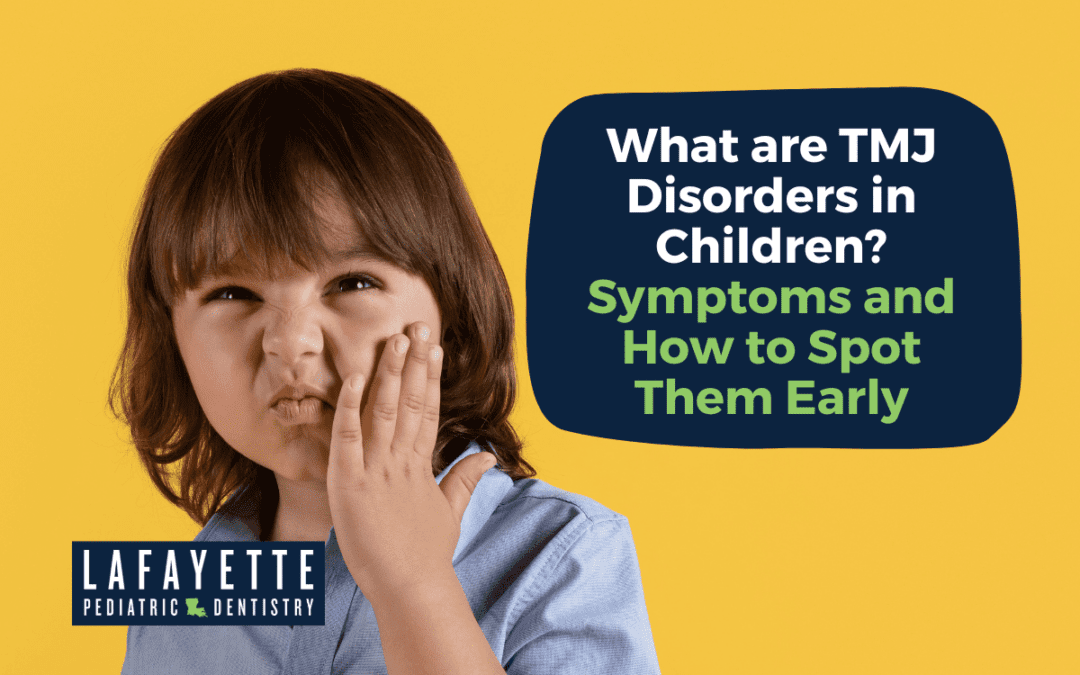Did you know that TMJ disorders don’t just affect adults? Unfortunately, they can impact children of any age too. Most of the time, your child won’t even realize they have it or might just brush off the symptoms.
That’s why it’s super important for parents in the Lafayette area to know what signs to look for so the condition can be treated early.
What Exactly is TMJ?
TMJ, or temporomandibular joint, is the joint connecting the lower jaw to the skull. You can actually feel it yourself by placing your fingers in front of your ears and trying to open your mouth. Feel those rounded ends of the lower jaw moving on both sides? That’s your TMJ.
This is actually the most used joint in the body since we use it for practically everything: eating, talking, smiling, yawning, and more. So, imagine if this joint doesn’t work properly, it can be really limiting for your child.
Normally, these joints should move freely without any pain or clicking sounds. When there’s pain or clicking when your child moves their jaw, that could be a sign of TMJ disorders.
How to Spot Signs of TMJ Disorders in Your Child
The most obvious sign of TMJ disorders is pain in the neck, jaw, and face when closing or opening the mouth, but there are other symptoms to watch for, such as:
- Popping or clicking of your child’s joint when closing or opening their mouth
- Problems with chewing or biting
- Ringing in the ears
- Swelling around the TMJ joints and pain when touched
- An asymmetrical jaw
- In rare cases, the jaw can lock open or shut
Many parents don’t realize that TMJ disorders can also cause headaches in children or even ear pain that seems unrelated to jaw issues.
Your child might complain about discomfort while eating their favorite foods or seem to avoid certain chewy or hard foods altogether.
Causes of TMJ Disorders
It’s not always easy to pinpoint a single cause since many factors can contribute to the condition, such as:
- Bruxism (teeth grinding)
- Trauma to the jaw or joints
- Stress or anxiety, which can make children more prone to clenching their jaws and grinding their teeth
Believe it or not, we’re seeing more and more kids with TMJ issues related to stress and anxiety. School pressures, social media, and even family dynamics can cause children to clench their jaws without realizing it. Some kids also develop habits like chewing gums, which can strain the TMJ over time.
Read more: How Does Chewing Gum Impact Kids’ Oral Health?
When to Have Your Child Checked for TMJ Disorders
If you notice symptoms of TMJ disorders happening frequently in your child, it’s best to discuss them with your child’s dentist.
They can perform necessary diagnostic procedures, such as an X-ray, and evaluate the severity as well as potential root causes to determine the best treatment since, as we discussed earlier, there are many factors that can contribute to TMJ disorders.
In extreme cases of TMJ disorders, such as when your child’s jaw becomes locked open or shut, it’s crucial to seek immediate medical attention. In these situations, contact your child’s emergency dentist right away to ensure prompt treatment and prevent further complications.
Treatment options will vary depending on what’s causing your child’s TMJ issues. Sometimes simply resting the jaw and applying an ice pack compress can help relieve symptoms.
If teeth grinding is an issue, a custom night guard may be recommended. In other cases, stress management techniques or even physical therapy could be part of the treatment plan. With early detection, most children respond very well to TMJ treatment.
Our team at Lafayette Pediatric Dentistry is here to help if you notice any symptoms of TMJ disorders in your child. Please schedule an appointment with our pediatric dental specialists or call us with any questions you have about our services!
